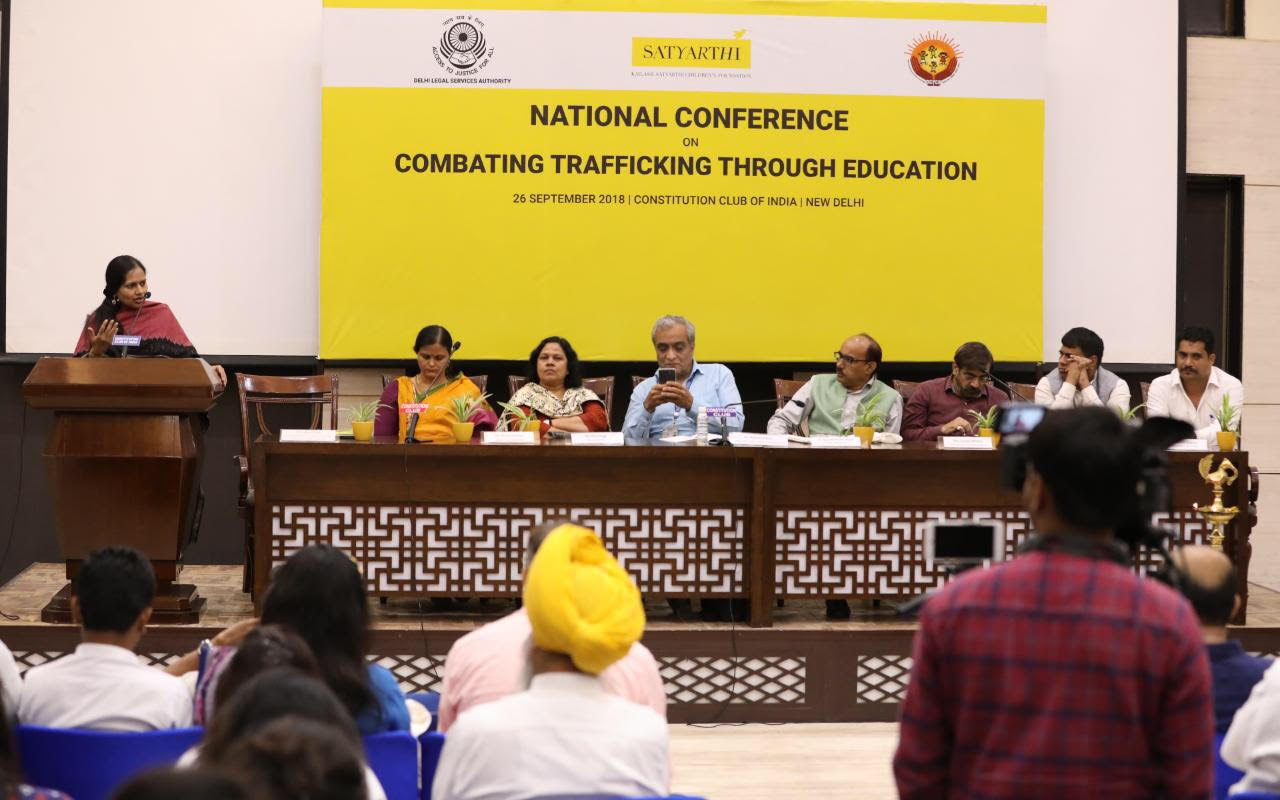40 percent adolescent girls in India are out of school: NCPCR New Delhi, September 26, 2018. The Kailash Satyarthi Children’s Foundation, in association with Delhi Legal Services Authority (DLSA) and Delhi Commission for Protection of Child Rights (DCPCR) organised a National Conference on Combatting Trafficking through Education at Constitution Club of India in Delhi. The conference emphasised the significance of education in the battle against trafficking in India. The conference advocated for free and compulsory education up to Class 12 so that disadvantaged children could be sheltered from agents of trafficking by remaining in the education system. On this occasion, Mr. Priyank Kanoongo, Member, National Commission for Protection of Child Rights (NCPCR) said, “Raising this issue for public discourse is an important step taken by KSCF and we appreciate this initiative. In India, 40 percent adolescent girls and 35 percent adolescent boys are out of school. Children who do not attend school are often the most susceptible to perpetrators of trafficking. They often come from poor families who are unable to afford the academic fee. For such children, education in secure and fostering school environments can build self-esteem and an awareness of their rights. Education can be a source of empowerment steering their future away from the ugliness of trafficking. Free and compulsory education to girls of 15- 18 years of age is the first step towards achieving this reality. ” The conference also focussed on an elaboration of the existing legislative framework and elucidating on the challenges faced in the rehabilitation process. Ms. Geetanjali Goel, Special Secretary, Delhi Legal Services Authority said DLSA closely works in coordination with the Kailash Satyarthi Children’s Foundation for rehabilitation of children victim of trafficking. “There are gaps and we need to identify them. After rescuing, we are not very sure if children would be accepted back in their families. In Delhi, drop out children are more vulnerable to offence and we must identify and map it. We are working on the module to educate children in schools in Delhi to prevent offence and protect them,” Ms. Goel pointed out. Dr. Nimesh Desai, Director, Institute of Human Behaviour and Allied Sciences said the rehabilitation should be for a shorter period and then try to put children back with their family or in work, which will help them in remaining productive and sustainable in a long run. “There is a major concern over mental health and psychological and emotional problems, post rescue of trafficking victims. This has to be met holistically by giving them comfort and social support. Let’s not be part of cover-up and silence. We should overcome it for the good,” Dr. Desai explained. Mr. Bhuwan Ribhu, Child Rights Activist stressed the need for public ownership of this issue. He stated, “The need of the hour is to ask ourselves what are we doing before we start blaming other agencies.” He added, “When a child is trafficked every fundamental right of that child is snatched. Let us pledge to make this a public movement so that every child is free, safe and educated.” The National Crime Records Bureau reported that in 2016 alone, 9,034 children were trafficked, a figure that had risen dramatically by 131% from 3,905 in 2015. Given such alarming data, there is an urgent need of a comprehensive approach to combat the organised crime of trafficking. The one day event saw eminent individuals from various bodies namely the National Commission for Protection of Child Rights (NCPCR), the State Commission of Protection of Child Rights (SCPCR), Civil Society Organisations, reputed academicians and child rights activists coming together for a discourse on prevention, protection and rehabilitation of victims of trafficking. They talked about the obstacles they face while executing the procedures for protection and rehabilitation of the victims of trafficking. In this regard, they stressed on the need of immediate interventions to put a stop to trafficking across the country. ABOUT KAILASH SATYARTHI CHILDREN’S FOUNDATION (KSCF) The Kailash Satyarthi Children’s Foundation (KSCF), set up by Nobel Peace Laureate, Mr. Kailash Satyarthi, is a global thought leader for prevention of exploitation and violence against children. KSCF works for the creation of a child-friendly world through direct interventions and programmes, research and capacity building, and campaigns for the mobilization of mass support and behaviour change. Mr. Satyarthi’s lessons learned guide the Foundation’s work to engage children and youth as part of the solution, build greater collaboration between governments, business and communities, ensure effective national and international laws, scale know-how and successful practice and create partnerships with key stakeholders.
40 Percent Adolescent Girls In India Are Out Of School: Ncpcr


